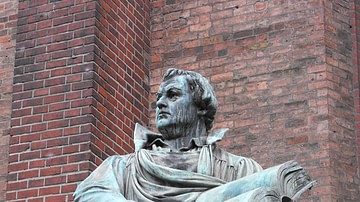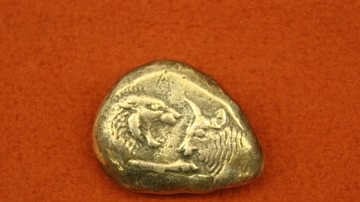Search
Did you mean: Bes?
Search Results

Article
Excerpts from Bradford's Of Plymouth Plantation
William Bradford's Of Plymouth Plantation is the first-hand account of the voyage of the ship Mayflower, founding of Plymouth Colony in modern-day Massachusetts, and the further colonization of the region of the United States now known as...

Article
The Brink's-Mat Robbery - Britain's Biggest Bullion Heist
Six armed robbers. One warehouse. Three tons of gold worth around $320 million today. The raid on the Brink's-Mat secure storage facility on the edge of London's Heathrow airport on 26 November 1983 was Britain's biggest ever gold robbery...

Article
The Price of Greed: Hannibal's Betrayal by Carthage
Hannibal Barca (l. 247-183 BCE), the brilliant Carthaginian general of the Second Punic War (218-202 BCE), had the military talent, expertise, and skill to have won the conflict but was denied the resources by his government. The Carthaginian...

Article
William the Conqueror's Harrying of the North
By the end of 1066 CE William the Conqueror had won a decisive victory at the Battle of Hastings, subdued the south-east of England and been crowned King William I in Westminster Abbey but there remained rebellion in the air throughout 1067...

Article
Gobekli Tepe - the World's First Temple?
Located in modern Turkey, Göbekli Tepe is one of the most important archaeological sites in the world. The discovery of this stunning 10,000 year old site in the 1990s CE sent shock waves through the archaeological world and beyond, with...

Article
Wall Reliefs: Ashurnasirpal II's War Scenes at the British Museum
The Mighty King 600 of their warriors I put to the sword and decapitated; 400 I took alive; 3,000 captives I brought forth; I took possession of the city for myself: the living soldiers, and heads to the city of Amidi the royal city, I sent...

Article
Luther's 97 Theses
Martin Luther's 95 Theses, credited with sparking the Protestant Reformation in Europe, have become a cultural touchstone since he posted them 31 October 1517, but the little-known 97 Theses, posted only a month earlier, are equally significant...

Article
Woodrow Wilson's Fourteen Points - A Plan for World Peace
The Fourteen Point Peace Programme of US President Woodrow Wilson (1856-1924) was presented to Congress on 8 January 1918 and outlined a new world order that would hopefully avoid another disaster like the still ongoing First World War (1914-18...

Article
The Importance of the Lydian Stater as the World's First Coin
The Lydian Stater was the official coin of the Lydian Empire, introduced before the kingdom fell to the Persian Empire. The earliest staters are believed to date to around the second half of the 7th century BCE, during the reign of King Alyattes...

Article
Harrison's Marine Chronometer
John Harrison (1693-1776) invented an accurate marine chronometer after several decades of research and development. While the pendulum clock had already been invented in the 17th century, a clock that could withstand the vagaries of the...